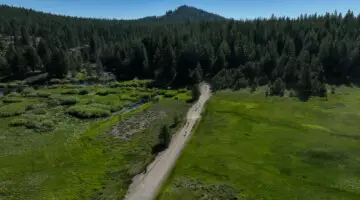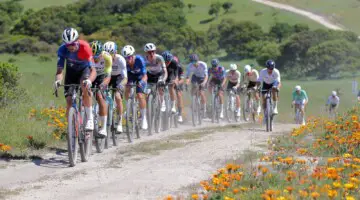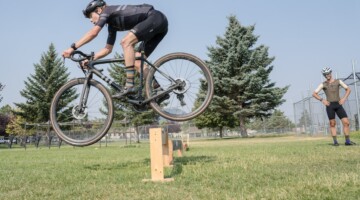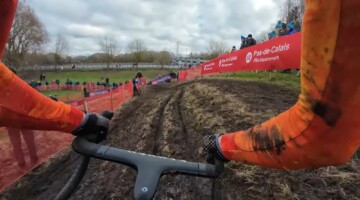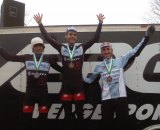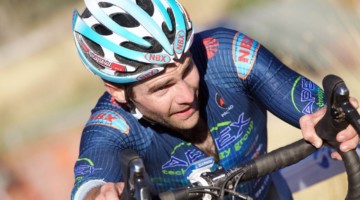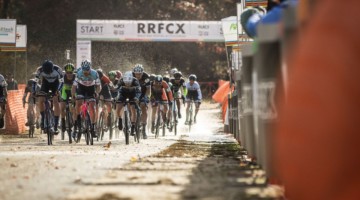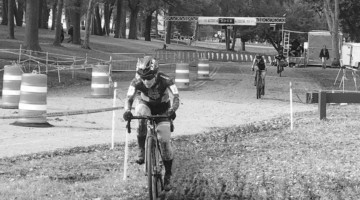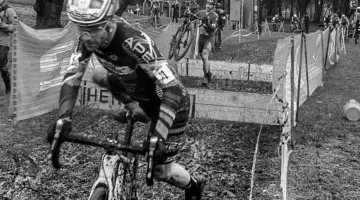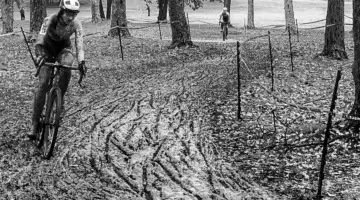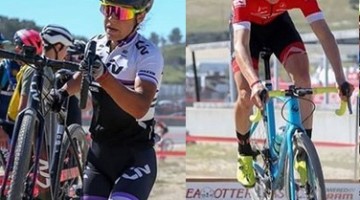When it comes to Northeast cyclocross racing and specifically Northeast-based cyclocross professionals, most think of the usual suspects: Adam Myerson of Cycle-Smart, Jeremy Powers of Rapha-Focus, Tim Johnson of Cyclocrossworld.com/Cannondale, the retired Dan Timmerman (formerly of Richard Sachs), Jamey Driscoll of Cyclocrossworld.com/Cannondale and the list goes on. However, if you attend almost any Northeast UCI level cyclocross race, you will find perennial strong man Justin Lindine mixing it up at the front of the race with the big names in the sport and often finishing on the top of the podium. Recently, Justin took the time to sit down and answer some of my questions regarding his recent move from full time road racer to full-time elite Mountain XC racer, his racing plans for the future and of course, cyclocross.
by Jesse Gutierrez
An Interview with the Wolverine – Justin Lindine
Jesse Gutierrez: First, I have to point out that we both grew up in Windham, NY. I believe you got your start racing under Nick Bove at Mountain Outfitters in Windham. So many people (myself included) have been introduced to Mountain XC racing by Nick. Also, some strong racers have come through the Mountain Outfitters program and have credited Nick for much of their success (Andy Guptil of Jamis Sutter Home and Seamus Powell of Giant Mid-Atlantic, to name a couple). Would you say growing up in a small town like Windham and riding the country roads and trails shaped you as a person and racer?
Justin Lindine: I think so, absolutely. Having access to all that great riding was definitely a deciding factor once I got into racing, but you are one-hundred percent right in citing Nick, and Windham Mountain Outfitters as the driving force behind it all. Before I got involved with the shop and Nick’s team, I was always ripping around on my old junker mountain bike, but who’s to say that I would have discovered racing?
JG: You started out as a mountain biker (Windham Mountain Outfitters), then moved towards road (Targetraining and BikeReg.com/Cannondale) and cyclocross and now are focusing mainly on Mountain XC and cyclocross. What made you go back to focusing on mountain biking during the spring and summer months?
JL: I had some excellent opportunities to race with great road programs the past few years with Targetraining, and BikeReg.com/Cannondale, but I think I was reaching a point where maybe I had plateaued as a rider, or maybe my interest had just flattened out … hard to say. In any case, after last ’cross season I was doing some serious soul-searching about my future with cycling and what my goals were. I had a couple of options on the table that involved racing on the road, but when Joe Mai of Joe’s Garage and Steve Roszko of BikeReg.com stepped up with a level of support that made it viable to do a mountain bike season without going into debt, it became a question of where I was going to have more fun and where I thought my strengths would take me further. That and the ability to dovetail the mountain season into the ’cross one a little better with some scheduled time off really sealed the deal.
JG: You have been having a super strong mountain season. You have won a handful of Root 66 NE regional XC races, a top 20 I believe at the Sea Otter short track XC, 11th at the Mellow Johnny’s XC, 4th overall at the Trans Epic taking the win on stage 7. Drilling a bit deeper into your results, you seem to be the top ranked non-full time pro in the XC and cyclocross results week after week. Now that you have shown you can hang with the top guys in XC and CX, do you have any aspirations to go pro full time and are you seeking more pro support from sponsors?
JL: Yeah, I am hoping that maybe something can come out of this season. I came into the year super-motivated to be back on my mountain bike and really honored by Joe and Steve’s commitment to my season, so it has been fantastic making some success out of all that energy. That being said, I know that at 27 I don’t have forever to make a pro lifestyle happen and that I need to raise my game if I want to have the next few years live up to my expectations. I would really like to have a killer ’cross season this year and see what comes of it all. It would be great to have a team take an interest and to really have a professional season, but I have also been the beneficiary of the best aspects of grassroot level sponsorship for most of my career and am always proud to represent those kinds of teams that foster the sport … so we’ll see what I happens I guess.
JG: How was the Trans Epic? I followed the race online and it seems that you guys were having a blast but also killing each other each day.
JL: That race was simultaneously the hardest and most fun thing that I’ve done on bike. The trails were pretty awesome, the race was well run, and the competition was legitimate. Every day was just “game on” all-out racing for 2.5 to 3.5 hours. The fact that I was able to mix it up every day with riders that I really respect and admire was an awesome feeling. It helped make the fact that getting out of bed by the fifth day felt hard a little easier to take.
JG: Do you think riding a hardtail 26er the whole week kept you off the podium?
JL: I don’t typically like to attribute success or failure to my equipment. In the hands of the right rider my bike was totally capable of winning that race. That being said, there were times when I personally wished I had a full suspension rig just because it would have been a little less fatiguing on my body. I think ideally you would have two bikes at that race, but there are definitely people who could have crushed on a hardtail, no problem.
JG: Do you plan on doing more Mountain XC stage events in the future?
JL: I’m not entirely sure. I would like to, but sometimes they are hard to work into a more XC-based season from a scheduling and a recovery-based point of view. I seem to do OK in the day-in, day-out sort of slogging, so maybe. I am also keen to try some ultra endurance races like the NUE 100 miler races. There is a possibility that I might give one of those a go as some base building towards ’cross season, but I’m not one-hundred percent sure yet. I’d also like to try one of the two-person team format stage races. That seems like a pretty awesome way to keep the motivation high over the course of many hard days.
JG: Who are your sponsors for Mountain XC this year?
JL: BikeReg.com and Joe’s Garage are my sponsors for the mountain bike season, similar to the setup I had racing ’cross this past season. BikeReg.com, as everyone knows, is the killer online registration service and Joe’s Garage is a fantastic shop in Haydenville MA. Both Steve Roszco (BikeReg.com) and Joe Mai (Joe’s Garage) are really strong proponents of the sport and are involved at so many levels in doing great things for cycling and racing.
JG – Your racing age is 27. Theoretically you are now just coming into your peak in terms of racing fitness and tactical maturity. In this regard, what has been the biggest hurdle (racing-wise), that you have overcome in the past few years.
JL: Figuring out how my body responds to training has been a big thing in the past couple of years. I started working with Kyle Wolfe of Finish Fast Coaching, and it has been a pretty radical improvement in how systematically I train. I was definitely one of those guys who just went out and rode hard all the time but without a lot of structure. Another thing that has been a struggle for me at times is the mentality to race larger races with the same aggressiveness and confidence that I race more local events. It’s difficult sometimes to realize that “yes, I do in fact belong here” when you are racing against people you’ve grown up reading about.
JG: So you just finished racing the Windham World Cup. How did it go and what were you able to take from the experience of racing against the world’s best on your home turf?
JL: Well, the race was a great experience, let me say that first. Unfortunately, my fork blew a seal on the first lap so I spent the whole race with zero suspension and the front end of the bike three inches too low. As you can imagine, not the most ideal situation for trying to ride in the most competitive field around. Anyhow, I missed the 80% mark for the last lap by something like 20 seconds, which was a real heartbreak. I was trying everything on the climbs and losing ground on the descents because the bike was handling so poorly, but what can you do? Mechanicals are a part of racing. Aside from that, the opportunity to race in my hometown was pretty amazing. It was an honor to hear my name on so many parts of the course … obviously I wish I could have had a better ride for everyone, but an honor none the less.
Cyclocross Questions:
JG: Lets switch to cyclocross now. Is it safe to say that your main focus this year remains the cyclocross season?
JL: Definitely. There was definitely a component of my decision to return to mountain biking that had to do with the ability to take a break at the end of July so that I could really build up to ’cross season. That’s something that I really haven’t had the ability to do racing road the past few years.
JG: When do you plan to hang up the Cannondale Hardtail and start focusing on the ’cross season?
JL: I think that post-Nationals I will take a break for a week, maybe a week and a half. After that, my coach and I are working on a plan to build back up for ’cross season that will probably include some more mountain bike racing and some road stuff, but a lot of specific ’cross work too.
JG: What does a normal pre-season cyclocross training week look like for you?
JL: That’s a difficult question to answer because I’ve basically always just gone right from road season into ’cross season. Generally I would come straight off the Green Mountain Stage Race and into the Vermont ’cross weekend. Because of that, I’ve often been going pretty well for the early part of the season, but always had to have a week somewhere in the middle of the season that involved being a little cracked and recovering. Hopefully this year I can structure to avoid that.
JG: On the topic of your equipment, if you had to keep just one item of equipment regardless of sponsors, what would it be? I know for me it would be my two SMP Strike Saddles.
JL: I’d probably have to follow your lead and say saddles. When I discovered the Fizik Aliante, it was like I had found the Holy Grail or something. I bought four of them and put them on everything I ride. It would be a bummer to have to use something that wasn’t as comfy as those, but at least for ’cross and mountain biking you’re not on the saddle statically for a long period of time like you are on the road.
JG: Have you set your schedule yet for the ’cross season and do you have any target races besides say Nationals?
JL: Things are still a little bit unclear, but I know for sure that I’ll be going to CrossVegas for the first time and that’s a pretty big early season goal. The field will be serious and it would be great to get the season going with a good ride in front of a big crowd. Aside from that, Gloucester is always a race that I love to race well at … since it’s sort of like a church of ’cross. Nationals remains a really big goal, and with its new time slot should be interesting.
JG: On the topic of Nationals, you were 11th last year and had a front row call-up. You were the top “working pro” or non-full time pro finisher, I believe. What do you need to improve on to make the next level of racing?
JL: Not being so nervous that I make stupid handling mistakes. Seriously though, I really believe that I am capable of racing well within the top ten at Nationals but ’cross is funny in that it’s one hour on one day so you don’t have a lot of room for mistakes.
JG: Do you think this season’s XC racing will give you that extra power and bike handing skills you need to make a run at a top 10 or top 5 at ’cross Nationals?
JL: It’s funny, because depending on who I run that theory by gets me different opinions. I think that the handling skills are definitely an asset that will carry over. The snappy speed-skills part of road racing is something that you don’t really get from mountain biking, but it’s also something that I can try to duplicate in training hopefully as I start gearing up for ’cross. Overall I don’t think it makes a tremendous difference one way or the other. If you look at the top of the US cross field there is a pretty solid mix of road-based and mountain based guys. One of the great things about ’cross is that there is always a course that favors certain skills over others … it acts as an equalizer I think.
JG: Any plans to make a run at qualifying for the World Championships in the US in 2013?
JL: Well, I’d be lying if I said it wasn’t something that I dreamed about, but the reality is that it’s a goal that I want to aim at but not get too attached to at this point. There are a lot of people who are going to be vying for those spots and it’s a little too far away to know where I’ll be standing in that battle.
JG: In 2009/2010 you raced in Belgium at the US cross-camp. Please tell me a bit about that experience. Just how fast are the Euro pros compared to the US fields and what was the biggest adjustment for you in terms of racing?
JL: That experience was amazing. It’s pretty incredible to be in a country that eats, sleeps and breathes it’s cycling culture. That, of course, is reflected in the racing. I don’t think anything can really prepare you for exactly how fast and how aggressive the racing is going to be until you’re there. Getting lapped by Nys and company is just a really sinking feeling when you realize just how far that gap really is between your fitness and theirs. On the other hand, just in the period of time I was over there I think I got more comfortable with the jostling for position, crazy courses, and deep fields and had some decent races towards the end of camp. In that regard I think it made me a better racer when I got back because I was more willing to fight for position, and just keep my head down and keep charging for the whole hour. Over there you might do that and get 50th, at least here you might crack the top ten.
JG: Were you able to talk with any of the top pros during warm ups and pick their brains on racing and equipment choices, etc?
JL: Not really. I was a little too awestruck to talk to any of the guys, but I did try to follow some of them around (from a distance) during warm-up to see lines. What you realize really fast is that their bike handling skills are pretty ridiculous sometimes. Watching the races online you can fall into the trap of thinking that they don’t look that hard, but there are some sketchy, sketchy courses over there that really make you appreciate how well those guys handle their bikes … while pedaling them at a million watts.
JG: What do you love most about racing your bike and specifically racing cyclocross?
JL: That’s a hard thing to quantify with words. There really aren’t many things that match the way it feels to leave everything you have, emotionally and physically, out there on a racecourse. You work so hard training and preparing and thinking about racing and then for that period of time after the gun goes off, everything about the world disappears and you are one-hundred percent in the moment. It’s something that I think society has increasingly lost in our very technological, multi-tasking age … that single minded moment of clarity. I think that’s part of why I like ’cross so much, because everything about it is compressed. It’s only an hour so there isn’t a lot of time for drifting out of the racing mindset. You experience all the highs and lows you might experience in a four-hour road race in sixty minutes. On a less psychological plane, it’s hard to beat ripping around in the dirt on your bike with the potential of someone paying you if you do it fast enough … right?
JG: When you line up for a race, who do you enjoy racing against the most?
JL: The list is too long really. One of the cool things about the US racing scene, and even more so in New England, is that you sort of end up knowing everyone. I guess that if I had to pick someone, despite losing the Verge Series to him last year, Adam Myerson is pretty fun to race against. I have a lot of respect for him and he’s got a different set of skills on the bike then I do, so it was always a challenge last year trying to figure out how I could tip things my way.
JG – Last season, you and Adam Myerson had quite the battle for the VERGE series. It was great to see him have such a strong season (getting his first and second UCI wins I believe). At the same time, it was tough watching you lose the overall on the last day. Is that overall loss adding to your motivation this season and are you targeting the VERGE series overall again?
JL: It definitely adds motivation to the season because I think I made a good step up last year but I also think I can continue that trend this year. Also, I know that I started last season strong and had some poor races in the middle that really set me back in the series points. That, I think, was really just the result of waning form so hopefully I can prevent that a bit this year. I’m not sure what the status of the Verge Series is this season so I can’t say for sure whether I’ll target it or not. I hope it continues, because it’s really an institution in New England and in ’cross in general really.
JG: What is your proudest/most memorable racing result or day on the bike in ’cross?
JL: I think if I had to pick from everything, I won the final stage of the Tour of Ohio when I was racing with Targetraining and that was pretty special. It was this epic day where a tornado almost blew in and the winds were crazy with pouring rain and the race ended on these really technical finishing circuits in town that included a cobbled climb and descent. My team did everything right all day, keeping me out of the wind, covering the early break and driving the race into town for the circuits so that when I hit the hill for the first time I just lit it up and soloed for the remaining laps in the driving rain. It was an amazing feeling to be able to back up all the work that had been done for me that day with a win against a good field. In ’cross though, even though I didn’t get to keep it, every time I pulled on that Verge Series leaders jersey was a special feeling because I can list a pretty distinguished bunch of names that have gotten to wear that in the past.
JG: If you could give a new racer any advice relating to cyclocross racing and/or training what would it be?
JL: Don’t be afraid to go harder then you think you can. ’Cross isn’t like road racing where you can be smart and conserve a bunch and then let it loose later. Every second of a ’cross race seems to be a potential decisive moment so you need to maximize every second. To that end, there will almost always be a section of the course that suits you … use it. I guess lastly, is practice, practice, practice. Skills and cornering are like free speed and since the rest of the race requires you to pedal god-awful hard, being able to gain a few free seconds through a turn feels like such a relief somewhere around lap five.
JG: You mentioned you are working with a coach. Do you train with power?
JL: I have been working with Kyle Wolfe of Finnish Fast Coaching since the beginning of last ’cross season, although he was my team director at Targetraining so our relationship goes back a bit further. That coupled with Joe providing me with a PowerTap has been really instrumental in my training over the past months. It’s been really great having a plan, having an objective opinion, and having an ability to quantify the workload I’m doing. I would recommend both coaching and power to anyone who wants to see serious gains in their racing. I feel like I foolishly squandered a lot of time I could have been training in a more focused way.
JG: a few “favorite” questions so that our readers can get to know you better:
Favorite Cyclocross race?
JL: Gloucester, because it’s got everything a course should have … and so much tradition.
Favorite cross rival?
JL: There’s a bunch of people who keep me on my toes: Myerson, Luke Keough, my shadow.
Favorite Pro Athlete?
JL: It’s a toss up between Sven Nys and Julien Absalon. Both are pretty amazing bike handlers, and tremendous athletes … and seem to my outside opinion to not be jerks.
Do you have any pre-race rituals or favorite meals?
JL: I’ll assume that you mean favorite meals before racing because otherwise I might be tempted to say Mexican food and margaritas. Seriously though, I keep the ritual stuff to a minimum because traveling it just too stressful. Aside from having my kit bag organized, I keep it pretty low key. But a good breakfast burrito is my preferred way to go if I have the option.
JG: Finally, is there anyone you would like to thank in terms of support over the years?
JL: There are too many to think of really. I’ve been super honored to have so many people help me out over the years. Obviously I owe a huge debt to Nick Bove and Lori Torgersen from Windham Mountain Outfitters for getting me into racing in the first place and continuing to be my best friends and mentors. All of my current sponsors BikeReg.com and Joe’s Garage for enabling me to have such a great couple of seasons, and my Wife and parents for their continual support … I feel like the Emmys or something now, so I’ll just suffice it to say that I want to say thanks to so many of you who have been instrumental in my development as a rider. I hope I can continue to do you all justice.
JG: Justin, thanks again for your time. I know I will be cheering for you all season. Keep up the hard work and I wish you much success during the remainder of the Mountain XC season and, of course, the cyclocross season.
[Editor’s Note: this year, Lindine will be staying on Joe’s Garage/BikeReg.com.]

